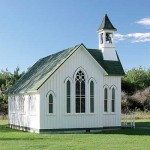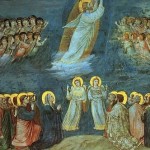When a church building is just one place among many
I’ve already suggested that it would be more healthy for churches if Sunday became just one day among other days and leaders became just one person among the church.
There’s another focus for many modern churches that can be dangerous: the focus on a particular place or building. Often, this is a church building that is used not only for meetings for almost all other service performed by the church. In fact, the church often finds its identity in the building itself. (Oh, no, they would not say that. But listen to what people say when church buildings are destroyed.)
In Scripture, churches met in many different locations. Then, they served others wherever they met them: in homes, in the market place, and yes, in the temple.
When the church focuses too much on meeting and serving in one particular building, we begin to lose the wonder and glory of the fact that God is with us always and everywhere.Often, you will see this combined with people asking God to “come to” this place or “meet with them” in this place. This is nonsense for the follower of Christ!
There is no place that we can go where we will not be in the presence of God. We are the temple of God, and God dwells and remains with each of his children. And, thus, any place becomes a place for serving others in order to give glory to God.
Get out of the building. Go to people. And serve God where the people are.
When a leader is just one person among the church
Besides the focus on Sunday, there’s another dangerous practice that I think is hindering the church (in general) from growing and maturing in Christ.
What practice is that? The reliance on one person’s service. Or, in the case of a team of leaders, the reliance on only a few people’s service.
Among most churches, meetings (i.e., “worship services”) could not happen, programs could not be planned, teaching would not occur, discipleship would falter, the church would not be the church if the leader(s) were not present. This is a problem.
Instead, as we read in the New Testament, leaders are simply more mature believers among the church. They are not the basis of all service, teaching, etc. among the church. Are they important? Yes! Would the church “shut down” without them? Absolutely not!
And, the church would not have to find a “supply” preacher if one of the leaders became sick or was out of town. How strange that would seem to the church in the New Testament!
In order for this to change in the church today, two things would have to occur almost simultaneously: 1) Leaders would have to give up their control over everything that happens among the church, and 2) Others (non-leaders) would have to get out of the pews (or chairs) and begin serving one another.
Where did I go? (May Synchroblog)
This post is part of the May Synchroblog on the topic “Life Unfurling.” The purpose of this synchroblog is to write about something that we’ve “let go of” along the way in our spiritual journey.
This is an easy one for me. (Well, easy in one sense. But, in another sense it is dreadfully difficult and painful.)
What have I “let go of”? Me. I’m not saying that to sound super spiritual. Instead, what I’m saying is this: The “me” that existed a few years ago does not exist any longer.
When I first graduated from college, I was extremely introverted. I enjoyed closing myself in my office, working on my computer, and interacting with other people as little as possible. I was also an extremely self-centered person. Oh, I loved my wife, but primarily because of what I got out of it.
In the years that followed, God has changed me. I’m now much more extroverted. I enjoy spending time with people. I actually enjoy serving people. Now, I love my wife for completely different reasons.
Wow… It seems so strange writing about what I used to be like, and what I’m like now. I did not plan to change. I was happy with myself.
Somewhere along the way, as I walked with God, little by little, that person changed. I’m not him anymore. I’ve left him behind. As I said, it wasn’t always easy. It often meant giving up who I thought I was and what I thought I could or couldn’t do.
I don’t look for that guy anymore. Years ago, I was perfectly happy being him. I don’t know why God changed me. I don’t know why I had to lose that guy. But, I’m glad that God has me here now.
(This post is not intended to suggest that introverts are somehow less mature than extroverts. I’m simply expressing how God has changed me over the years. I know some people who are introverts and who are very mature in Christ, and I thank God for them.)
—————————————————————-
These people are also writing about “Life Unfurling” for the May Synchroblog:
- John Martinez at Indie Faith – Letting Go of the Holy Me
- Beth Patterson at Finding Ground – What is Passed Over is Not Love
- Jeremy Myers at Till He Comes – Help, I’m Lost and Can’t Find Myself
- Ellen Haroutunian – Life Unfurling
- Marta Layton – On Burdens, Blessings, Babies and Bathwater
- Alan Knox at The Assembling of Church – Where Did I Go?
- Crystal Lewis – What Happened When I Let Go
- Pam Hogeweide at How God Messed Up My Religion – Letting Go of a Church-Centered Me
- K.W. Leslie at the Evening of Kent – Legalism, Anti-Legalism, and Anti-Anti-Legalism
- Ryan Harrison at How We Spend Our Days – Scraping the Barnacles
- Kathy Escobar at The Carnival in My Head – Letting God Off the Hook
- Christine Sine at Godspace – Giving Up For God, What Does it Cost?
- Liz Dyer at Grace Rules – What Do You Do When You Are Not Sure
- Dan Brennan at Faith Dance – Letting Go for a Greater Good
- Elaine Hansen – Recovering Control Freak – Let Go?
- Wendy McCaig at View From the Bridge – Embracing the Grey
- Chris at The Amplified Life – Seasons of Life
Replay: Would God allow his people to continue in disobedience for a long time?
Three years ago, I wrote a post called “God would not allow it.” In this post, I try to answer this question: If the church should not be so institutional, then would God allow it to go on like that for so long?
—————————–
Often, when I talk to people about how my understanding of church has changed from institutionally-focused to people-focused, I get one of several responses: 1) “Everybody knows the church is about people” – although their actions and priorities demonstrate otherwise, 2) “I don’t understand the difference” – which is a huge problem, 3) “If God did not want the church to become an institution, then he would not have allowed it to exist as an institution for so long” – ummmm… well, okay, I guess I need to deal with this answer.
If God did not intend for the church to be institutionally- and organizationally-focused, is it valid to claim that God would not allow it to exist in that state for as long as it has?
In Exodus 12, God commands the children of Israel to celebrate the Passover every year at a specific time, in a specific way. In Leviticus 23:5, the command to keep the Passover is repeated. In Number 9, the command to keep the Passover is repeated again. In Deuteronomy 16, Moses repeats the command to keep the Passover for the fourth time – this must be very important.
In Joshua 5, after crossing the Jordan River, the children of Israel celebrate the Passover for the first time in the Promised Land. But, the Passover is not mentioned again until 2 Chronicles (also 2 Kings).
In 2 Chronicles 34:8-15, we learn that in the eighteenth year of Josiah’s reign over Judah (around 620 BC), workers discovered the Book of the Law while restoring the temple. After reading the Law, Josiah decided to observe Passover. Specifically, Scripture tells us:
Josiah kept a Passover to the LORD in Jerusalem. And they slaughtered the Passover lamb on the fourteenth day of the first month… No Passover like it had been kept in Israel since the days of Samuel the prophet. None of the kings of Israel had kept such a Passover as was kept by Josiah, and the priests and the Levites, and all Judah and Israel who were present, and the inhabitants of Jerusalem. (2 Chronicles 35:1, 18)
(Note: In 2 Chronicles 30:1-3, we read that Hezekiah attempted to keep the Passover as God prescribed, but he kept in on the wrong date.)
Saul began reigning over the combined kingdom of Israel sometime around 1047 BC. According to 2 Chronicles 35:18, there had not been a Passover since before the kings – before King Saul. Thus, the children of Israel had not obeyed God in keeping the Passover for over 400 years. (By the way, some scholars suggest that judges ruled Israel for up to 400 years. Thus, Israel did not keep the Passover as God prescribed for 400 – 800 years.)
Saul did not keep the Passover as prescribed. David did not keep the Passover as prescribed – even though David was a man after God’s own heart. Solomon – the wisest of all of the kings – did not keep the Passover as God prescribed. The prophets – Nathan, Elijah, Elisha, Isaiah, most of the “minor prophets” who lived before Josiah – did not warn the kings or the people about failing to keep the Passover.
Would God allow his children to go so long without obeying him in a manner which he specifically prescribed?
Is it lack of knowledge? Is it apathy? Is it something else?
Chris at “The Amplified Life” (I still love that blog name) has written a very good post called “Is More Knowledge the Answer?”
In the post, Chris quotes a statistic that “65% of professing Christians never read the Bible.” After examining this statistic, he asks this question, “Is more knowledge of the Scriptures the answer that the Church needs?”
He answers his question with both “yes” and “no.” His answers are very good, so you should read them. In the comments, I also answered his question with “yes” and “no,” but for different reasons.
One point that I raised is that the Scriptures were not available to Christians in the early church the way they are available today. Those early Christians could not have read the Scriptures every day even if they wanted to. I’m certain they heard the Scriptures read and discussed when they gathered with others, but they could not hold a copy of a Bible and read it for themselves in their homes (for the most part). This was true because of availability and literacy until quite recently.
Here’s the problem though… if you examine the book of Acts and the other books of the New Testament, you will find that those early Christians looked much different than Christians generally look today… even though they did not have ready access to Scriptures.
So, reading the Bible is not the issue.
Is the issue apathy? Perhaps, but does that point to a deeper issue?
It’s obvious that many, many professing Christians do not seem to care about the things or God, or if they do care about God, they don’t care about other people. (At least, they don’t care in the same way we see the Christians in the NT caring for others.)
Why? What do you think the issue is?
What is Pentecost?
Forty days after Jesus was raised from the dead, he ascended into heaven. (Acts 1:3) About 10 days after that, on the Day of Pentecost, the Holy Spirit indwelled 120 of Jesus’ followers. (Acts 2:1-4) But, what was this “Day of Pentecost”?
“Pentecost” is a transliteration (sound-alike) of the Greek term that means fiftieth. In ancient Jewish tradition, Pentecost or Shavuot happened 50 days after the first Passover (as found in Exodus). It marks the day that God gave Moses the Ten Commandments on Mt. Sinai. Shavuot also marked the ending of the Passover season.
In the New Testament, Pentecost is only mentioned in Acts 2:1, Acts 20:16, and 1 Corinthians 16:8. The first occurrence marks the day (about 10 days after Jesus’ ascension) that the Holy Spirit indwells those first followers. The last two instances of “Pentecost” in the New Testament occur when Luke and Paul (respectively) mention that Paul desired to return to Jerusalem before Pentecost toward the end of his third missionary journey.
In the Old Testament, Shavuot is called the Festival of Weeks (which is the literal meaning of the word Shavuot) (Exodus 34:22 and Deuteronomy 16:10), the Festival of Reaping/Harvest (Exodus 23:16), and the Day of First Fruits (Numbers 28:26). The other ancient Jewish writings, other terms are used to indicate Shavuot (Pentecost).
Thus, Shavuot (Pentecost) commemorates both the giving of the Ten Commandments and the annual grain harvest in Israel. (There are certainly possible connections there with the giving of the Holy Spirit, but that connection is not directly made in the New Testament. Any connection – while possible and perhaps probable – would be speculative on our part. Of course, speculation is fun at times.)
Five books of the Hebrew Bible (Tanak) are known as the Megilloth. These books are Lamentations, Ecclesiastes, Esther, Song of Songs, and Ruth. In Jewish tradition, each of those books was associated with a certain festival. Ruth (as you might expect) was associated with Shavuot (Pentecost).
It was during this time that 120 disciples of Jesus were gathered in the room where Jesus and his disciples had their last meal together before his crucifixion. At Jesus’ request, the Father then sent the Holy Spirit to indwell his children (creating a new remnant), and they immediately began testifying about him to everyone they came into contact with.
We say we believe the Bible, but do our actions prove otherwise?
Recently, I’ve enjoyed following Jon’s tweets. (He blogs at “1 Jon“.) And, because I follow him on twitter, I saw his recent blog post called “Why don’t we believe the Bible?”
His post is a little satirical, a little pointed, and a little sarcastic; just the kind of post that I like and just the kind of post that often makes us look at ourselves and our lives differently.
For example, consider this short excerpt from his post:
When Paul says “I did not come to you in words of wisdom, but I decided to nothing among you except Christ and him crucified”, why do we feel that we have to rehearse great speeches and study apologetics to share your love with others? (1 cor 2)
When Paul says “you are a letter written from Christ, delivered by us, written not with ink, but with the spirit of the living god on the tablet of your hearts”, why do we sometimes feel like we have nothing to share about you?
Ah, yes, I can see myself in both of those questions from time to time. You should take a moment and read the rest of Jon’s short post.
Can you think of other ways that our actions (generally) demonstrate that we don’t really believe what we say we believe?
The Ascension of Jesus Christ
According to the Book of Acts, about forty days after Jesus’ resurrection and a little over a week before Pentecost (the day the Holy Spirit indwelled those 120 believers), Jesus ascended into heaven. Luke says that Jesus rose up into the sky until his followers could no longer see him. (Acts 1:9)
The church often talks about the importance of the resurrection. And, we understand the importance of Pentecost, even if we don’t talk about it quite as much. But, what about the ascension of Jesus? Is it important? Or is it just a blip in the history of the church?
In fact, according to Jesus himself, his ascension is very important.
Several times, Jesus told his followers that he would be returning to his Father. Of course, they probably didn’t understand exactly what he meant when he said that (as demonstrated by their question in Acts 1:6.
Throughout John 14, for example, Jesus tells his followers three times that he is going to the Father. (John 14:2-3, John 14:12, John 14:28) Furthermore, in that same passage, Jesus tells them that he is going away (although not specifically “to the Father”) in John 14:18.
In this passage, while Jesus is talking about going away to the Father, he also continues to instruct his followers about another important event: The Father is sending the Holy Spirit to dwell in his children. The two events seem to be interrelated in John 14.
In John 14:16, Jesus said that he will ask the Father (while he is with him) and the Father will give them the Holy Spirit. In John 14:26, again Jesus said that the Father will send the Holy Spirit to them.
But, while the connection between Jesus going away to the Father and the sending of the Holy Spirit seem related in John 14, Jesus does not directly specify that there is a relationship between the two events. However, when we get to John 16, Jesus specifically says that the sending of the Holy Spirit is directly related to his going to the Father:
I did not say these things to you from the beginning, because I was with you. But now I am going to him who sent me, and none of you asks me, ‘Where are you going?’ But because I have said these things to you, sorrow has filled your heart. Nevertheless, I tell you the truth: it is to your advantage that I go away, for if I do not go away, the Helper will not come to you. But if I go, I will send him to you. (John 16:4-7)
In this passage, Jesus not only connects the sending of the Holy Spirit (“Helper” in the ESV translates a word that Jesus used for the Holy Spirit earlier in John 14:16) when he goes to the Father, but he tells his followers that it is better for him to go away so that the Holy Spirit could come.
While we could speculate, Jesus does not explain why he has to go away for the Holy Spirit to come. However, it seems clear from the passage above that the two events are related. So, without the ascension of Jesus, there would be no Day of Pentecost. If Jesus did not go away to the Father (and leave his followers for about a week), then the church today would not be indwelled by the Holy Spirit.
According to Jesus, it is better for us today that we are indwelled by the Holy Spirit than for Jesus to walk among us physically. As we look back on the time when the church celebrates the resurrection of Jesus and forward to the time when the church celebrates the coming of the Holy Spirit, let’s not forget that Jesus ascended, so that the Holy Spirit could come.
Replay: I used to believe… Now I believe…
Two years ago, after being inspired by a friend’s post, I wrote a post called “I used to believe… Now I believe…” In this post, I laid out some of the ways that I my beliefs about the church had changed over the last few years. Feel free to present how your views have changed (or not changed) in the comments.
———————————————————
I used to believe… Now I believe…
My friend Lew from “The Pursuit” started a new meme with two posts called “This I Used to Believe” and “This I Now Believe“. I decided to do Lew’s meme, but discuss things that I once believed and now believe concerning the church – since this blog is primarily about the church. So, here are some things that I once believed with what I now believe:
I used to believe that preaching a 30-45 minute sermon on Sunday morning or night was the epitome of the Christian life. Now I believe that neither preaching nor listening to a sermon on Sunday morning should be the center of a Christian’s life. Instead, serving and loving others in the name of Christ is much more important. Plus, many times, a five minute personal exhortation is much more effective than a general sermon.
I used to believe that leadership was the greatest type of service. Now I believe that service is the greatest type of service. However, I do believe that we should follow those who serve. But, those who serve are not so concerned about gathering followers. Instead, they are concerned with serving.
I used to believe that the 501(c)3 organization was the church. Now I believe that the people are the church… really… no, really. The church can organize, but the organization is not the church.
I used to believe that the senior pastor (and the staff under his direction) was responsible for all teaching and discipleship. I now believe that while elders (pastors) should teach and disciple, this responsibility is for every follower of Jesus Christ, regardless of the education, gifting, training, abilities, positions, etc.
I used to believe that discipleship was a 1-2 hour per week class with a workbook to be completed by those who were very spiritual. I now believe that biblical discipleship occurs 24 hours per day, 7 days per week. We must live life with one another in order to disciple one another. This cannot happen in a classroom alone, or in a programmed event alone.
I used to believe that it was the leaders’ (elders/pastors) responsibility to “run” the church meeting so that the church benefited. I now believe that it is every believer’s responsibility to think about the others in their community, and speak/serve during the meeting in a way that encourages others towards love, good works, and maturity in Christ.
I used to believe that education and knowledge were the same as maturity. I now believe that education and knowledge often have very little to do with maturity, and can be a source of pride and immaturity.
I used to believe that if I could sit quietly during and learn from the pastor’s sermon, then I was spiritual. I now believe that if I can listen to the Holy Spirit and obey him, then I am spiritual.
If you’d like to take part in this meme, please leave a note here, or on one of Lew’s posts.
The time between Jesus’ ascension and the day of Pentecost
This Sunday, we start studying the Book of Acts together as the church. I’m sure that there will be alot of good questions and answers and discussion when we dig into Acts 1 in a few days.
But, as I’ve been thinking about Acts 1, a question keeps popping into my mind:
How important is the time between Jesus’ ascension and the day of Pentecost for the church today?
In the Book of Acts, Jesus ascends into heaven in Acts 1:9. The Holy Spirit descends on the Day of Pentecost in Acts 2:2.
What can we as a church learn from the 17 or so verses between those two events?










